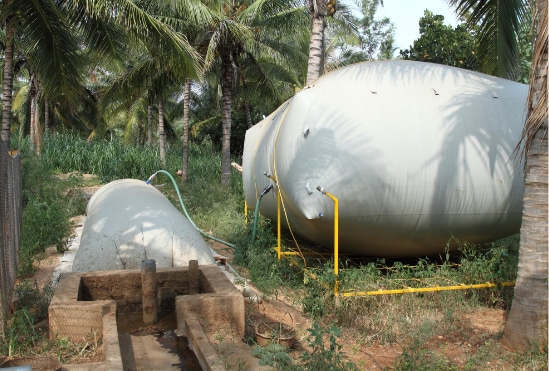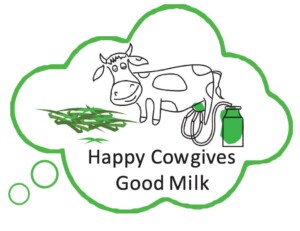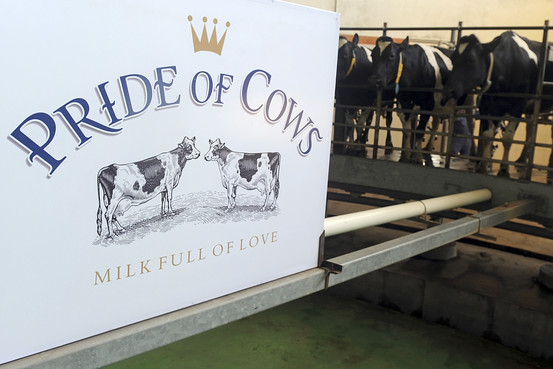A few fresh, natural and organic farm-to-home milk supply firms are seriously stepping up their game across India using apps, technologies like internet-of-things (
India’s Rs. 9 lakh crore milk business is in disarray due to oversupply and farmer distress due to drought-like conditions is nearly a third of rural India. Steep fall in milk prices in recent months is making it even worse.
The new private players are attempting to script a fine balance between farmer and consumer interests as the sustainable business model. They are trying to improve the overall health of farmers and consumers across the country
In February 2019 Matrix Partners India led a ₹70-crore ($10 million) investment round in Country Delight, a direct-to-home, mass premium fresh milk brand based near Delhi.

Founded by two IIM Indore graduates Chakradhar Gade and Nitin Kaushal in 2015, Country Delight, Mumbai-based Parag Milk Products with their brand Pride of Cow, Bangalore-based Akshayakalpa and Farm Connect are rearing to capture the huge potential for farm-to-home fresh, natural and unadulterated milk market.
Country Delight, with 70,000 customers as of June 2019, controls the supply chain and sources the milk from local farms and delivers directly to consumers’ homes with minimal processing within 24-36 hours. Their service is delivered through a mobile application. It plans to use its new funds to start operations in eight cities nationally.
Pride of Cows procures 1.2 million litres of milk which it says it instantly pasteurizes, chills, packages in bottles and sends to consumer homes in Mumbai, Pune and Surat. The process has nearly zero human touch to ensure the ‘absolute purity’ while retaining the taste and structure of the milk.
Pride of Cow is the brand name of Mumbai’s publicly listed Parag Milk Foods which was started in 1992 by Devendra Shah. The company is India’s second largest producer of cheese under brand Go and the country’s largest producer of cow ghee under brand name Govardhan. In June 2019, Pride of Cows said it had become the first Indian brand to sell fresh milk in Singapore.
Packaged milk – Is it really milk?
The year 1970 marked the beginning of India’s ‘White Revolution’ which transformed the country from a milk deficient nation to become the world’s largest milk producer in three decades. Any revolution which doesn’t innovate frequently leaves behind angst that are very difficult to address. The White Revolution may have turned brown if reports that suggest that 70% of Indian milk is not fit for consumption are to be believed.
This story is familiar across India – farmers are barely making any money, a third are even losing it, from selling milk to the milk cooperatives and private players. To make their ends meet farmers are compelled to earn their margin by adulteration and resorting to unhygienic production conditions. Most consumers believe they are left with no choice.
The big state-supported milk cooperatives have excellent quality parameters at the plant level but have little control in how milk is produced at the farmer level and how it is delivered by distributors.
A survey by The Food Safety and Standards Authority of India in 2012 found that nearly 70% of the milk samples it tested nationwide did not meet food safety standards. A majority of samples were diluted with water or contained impurities like urea, liquid formaldehyde
“In the milk cooperative model like
“Quality inspectors in milk federations know that farmers add substances like caustic soda, hydrogen peroxide, urea, sugar, salt among other things to milk they unload at the collection centres. The inspectors only check for fat content,” he adds.
“Chemicals such as hydrogen peroxide which extends the life of milk is harmful as its effect is felt over a period of time, just like DDT whose harmful effects were known only after prolonged consumption.”
Over a decade or so, a few entrepreneurs have been exploring the big opportunity for supplying pesticide-free and ‘natural’ milk across India. Most of them call it fresh and natural milk’ for which consumers are happy to pay a premium of 40% to 70% to the regular milk offered by cooperatives.
What started as an experiment a decade ago, the clean and fresh milk revolution may be seeing the beginning of an inflection point in large Indian cities.
The second white revolution could be a pure milk revolution where a good number of Indians will finally have the option of drinking unadulterated milk at an affordable price point.
Affordable premium

Country Delight is raving about its ability to keep its natural milk promise at Rs. 53 to Rs. 55 a litre while the regular packaged milk is priced between Rs.40 and Rs.45 a litre across the country. Many milk brands’ price in the premium segment charge is 30% to 50% more.
Chakradhar Gade told this writer that while market definition for open milk segment is difficult to define, the potential is as high as 30% in Delhi and 50% in Mumbai among the middle class consumers. “By working with farmers directly we are able to offer at an affordable premium. Our promise to give good product to consumers is helping us give better margins to farmers.”
Chakradhar said they are now operating in Pune and Bangalore from their Delhi base. Started in 2015, he said the first two years were very difficult. “We had very difficult times initially, over time we figured things out. Today we have a very good understanding of what the consumer wants. In fact, consumers have taught us everything. It’s a big opportunity we are chasing. We are happy about the social impact we are able to make.”
The key to their model is employing what they call ‘morning entrepreneurs’ like auto drivers. By working for three to four hours in the morning, thousands of young men are able to double their income in Delhi.”
Across India, while the loose milk segment is growing at 7% to 8% a year, the premium segment is growing by an average of 15%, he said. The consumers today have a good choice of premium milk. “It’s finally a brand play. It’s highly organized and differentiated value proposition.” Interestingly, innovations of all the new players are happening both at the consumer and the animal level.
Milk business will soon be a pure tech play
Milk is the largest crop in India in terms of value.
And a staggering 6 crore rural households in India depend on dairying for livelihood. 70% are small and marginal farmers and landless families.
A report by IMARC Group “Dairy Industry in India 2019 Edition: Market Size, Growth, Prices, Segments, Cooperatives, Private Dairies, Procurement and Distribution” states that the dairy market in India reached a value of Rs. 9,168 Billion (approximately 9 lakh crore) in 2018. Looking forward, it states, the market is expected to reach a value of INR 21,971 Billion (Rs. 21 lakh crore) by 2024, exhibiting a CAGR of around 16% during 2019-2024.
While Country Delight calls itself a digitally native vertically integrated brand, Farm Connect says it has a 360-degree approach to everything including application of technology.
While apps will be the life-line for new-age players, they don’t seem too excited about the app aggregators playing a meaningful role for some time. Chakradhar says, “Since margins are wafer thin it’s early days for them. Their unit economics are yet to be proven.”
Interestingly, the emerging hi-tech is likely to improve the quality of milk of the bulk players as well. Heavily tech-focused firm Farm Connect, says its Partner Sathi Dutta, is happy to share their technology with anyone. She told this writer that they will be unfolding their latest technology which has the ability to monitor most of the parameters right from a single cow’s milk up to the delivery point to the consumer.
Farm Connect’s new technology solution, she says, will be capable of capturing entire data from remote locations and test almost every parameter. This technology already exists in the developed markets but are very expensive for us to import. She says her solutions are affordable for farmers.
It’s interesting that all the new-age private farm-to-home milk firms have the following practices in common with marginal differences – they engage with the farmers directly thereby eliminating middlemen; they pass on the premium they get from consumers and pay farmers on time which helps them with better cash flows, a critical element they miss while dealing with milk federations. These best practices are expected to lure farmers to private tech-savvy firms.
The private players’ farm-to-home fresh milk market share is estimated to be between 3% and 5% growing at 15% to 20% a year. The premium organic milk segment is still
With a game-changing approach to dairy sector that consumer delight should also be farmers’ delight, the new players may well be reshaping India’s milk industry. The pressure from neo-tech-savvy entrepreneurs could spark a national movement for cleaner and healthier milk as well as more financially healthy farmers.
Father of Indian Organic Milk
Dr. Sreenivasa Reddy, 65, is India’s pioneer of organic milk business. He founded Akshayakalpa a decade ago and launched his second venture Farm Connect in early 2018 with greater focus on back-end production excellence. A Gandhian, he has been a crusader of sustainable farming all his life. Excerpts of his chat with Benedict Paramanand.

What are the major trends in the dairy sector?
Today, average consumers are aware about the poor quality of packaged milk. They know about the problems but don’t believe they have alternatives.
What’s the problem?
The milk most of us consume dies three times before it is consumed.
Because of the massive scale public cooperatives are not able to ensure quality. They have to pasteurize to prevent milk from spoiling. First death is bacterial death – in six hours from farmers home to collection centre bacteria eats up milk protein to grow. Milk protein becomes bacterial protein.
In the second phase pasteurization kills bacteria – about 80% bacteria die when milk is heated to 72 degrees – that’s the second death. We boil milk many times during the day – this is its third death. Whatever remains is almost not fit for human consumption. The only other way is to convert this milk to curds – where bacteria gets rebuilt. Curd is better than boiled milk.
Also, in pasteurization milk gets denatured. The nature of protein changes. Milk has 15 live enzymes which are the determining factors. Milk is a live product – it cannot be sterilized.
Also, normally people associate milk with high calcium content. With pasteurization calcium reduces significantly.
Pasteurization was needed to preserve milk 100 years ago. Today, there is no need to pasteurize if we have cold chains. Cold chain is possible in every village today.
We were all brought up on milk straight from the cows udder. Today, with our technology at Farm Connect, the same milk is made available in a much better form. Offering both flavor and nutrition.
What is Sustainable Farming
We want to demonstrate and establish the concept that sustainability at the farm level is critical. If any farmer-related initiative is not sustainable it will not work in the long run. It can be either in milk, eggs, poultry, meat. We have to ensure quality of land, quality of fodder and the health of the animals. If all these are not taken care of together it will not work. And unless farmers see enough money in this it will not work either.
Why adulteration
For example, cost to a farmer in Kolar near Bangalore, is Rs. 28 to Rs. 30. What the cooperatives pay him is Rs 21 and the subsidy component is Rs. 5. Net-net, farmer is a loser. At Farm Connect, we have started paying Rs. 30 to Rs.35 a litre.
Because dairy farming has become a non-paying proposition, farmers tend to add urea directly into milk to raise the solid content in the milk.
Weaning farmers out of this mindset is important to produce pure milk. At Farm Connect we are in the process of doing it and it is possible.
How to ensure purity of milk at the farm level
They should not buy anything from outside. No industrially-processed product is required – no cakes, no cattle feed. Agro-byproducts like groundnut cakes are being pushed on farmers. These cakes come with a lot of aflatoxin load which are poisonous carcinogens.
The alternative to the commercially-produced cakes is to grow a lot of legumes which provide protein. We can even brand our milk as aflatoxin free.
Antibiotic is the biggest danger. If you test 10 brands of milk for antibiotics at least 9 will be positive. It is used by farmers directly into the udder.
Most of the milk supplied today is a big health hazard. All govt agencies know about this yet they don’t talk about it.
We are reinitiating the process of producing milk in its original form. What we are giving the market is untreated, unpasteurized milk straight to consumers’ home.
Farmers’ interest first
Milk is a farm product where farmers are the key players. We cannot scale without taking farmers’ interest into account. Money is an important aspect. Beyond that sustainability of the farm itself is to be addressed so that farmers don’t need to beg or borrow.
What he needs from the market like fertilizers can be replaced by cow-dung based fertilizers which can be managed easily.

He depends on power which can be managed with a biogas plant. He should be independent of grid power. Use power whenever he wants rather than whenever the distribution body decides to give.
Farmers depend on labor which is hard to get even when there is mass unemployment in the country. Make mechanization in a way that dependency on labour can be taken away. Automation of farms is needed.
Also, better design and construction of sheds is needed so that cow dung is managed through automation. Take away drudgery through flushing. Dung goes to biogas plant and the slurry can be used as fertilizer. Automation is expensive but affordable. It can result in retaining youth in the farms.
This has a massive social implication by reducing migration to towns. Farming can become attractive to the youth again.
Farm Connect Model

Amul’s and other state milk federation’s collection model of dairying has contributed to today’s problems. Here the federations don’t have control on production. They have to reengineer themselves to prevent poor quality of milk. But because of the sheer volume, it’s not easy, but is possible. We cannot doubt the milk federations and governments intentions, but their methodology and process need to change.
At Farm Connect we have taken up production model of dairying – complete production is under our supervision. We don’t collect milk from the villages. We produce it with farmers in identified farms so that quality is ensured.
You are a pioneer of organic milk in India
I come from a sustainable farming background and have worked in this field for 30 years. I worked with a Bharat Agro Industries Foundation, which works on Gandhian principles of self-reliance. I started various programs to essentially built sustainable farming in India especially in the Pune region.
I was the founder of Akashakalpa in 2010 and built it for seven years as India’s first organic milk brand supplying 20,000 liters a day. I moved out due to various issues to start Farm Connect in 2018. Started as a solo player and now got two partners to support me. After that many me-too brands came up trying to ride on our start.
The potential for organic milk is huge but we are not equipped enough yet to maximize this opportunity. We are looking for funding. Now managing with equity contribution by founders.
We operate on a cluster model near Bangalore. This has been successful. We are trying to replicate this model in Chennai. Our dream is to create a 10 lakh litre potential in 10 clusters with one lakh litre per cluster.
The corporate style dairy farming of private milk brands is not sustainable because of difficulty of access to land. Ours is the only scalable model where farmers own their land and we offer technical support.
We are tapping funding. We are at a beginning stage where we still need angel funding. We have found a lot of unfavorable terms in the venture capital funding model.
We would access debt funding too. Until we reach a stage of 50,000 liters a day and good market presence, then we may tap into VCs.
Unfortunately, bank funding is difficult in India and that interest rate at 15% is very high. Priority sector lending at 11% is available for farmers but banks are shy to lend to farmers because of various challenges like threat of farm loan waivers. Unless farmers are funded well this model is not scalable. We need financial innovations here.
Farm Connect
More than 2,000 farmers turned up at a Farm Connect organized meet in Mandya, 100 kms from Bangalore, in April 2019. This is a well-irrigated district with grows sugarcane and rice. The farmers’ keen interest in exploring new opportunities was clearly palpable.
Farm Connect will use this excitement to scale from a cluster of 50 farms currently involving 300 to 500 farmers per cluster with each farm rearing about 25 cows. The cluster approach has several benefits both for farmers and the company.
Farm Connect is a process-intense entity which it is proud of. It believes a robust process makes it easier to replicate and achieve maximum metrics in every sphere.

“We have created a protocol which is easy for farmers to adopt,” says Vivek S Patil, partner in the firm with experience of having worked in large banks and a food venture “Our farms look very different compared to others. We expect word-of-mouth effect to grow in size,” he adds.
Sathi is proud that farmers in her cluster are able to generate income of Rs. One lakh net profit a month with 25 cows. A big relief to farmers who have been in distress in recent years.
The Farm Connect farms are automated in such a way that cow dung is automatically moved to biogas plants without human intervention. With biogas they get 8 hours of power as a 25-cow farm produces 1,000 kg cow dung a day. This takes care of energy needs for daily cooking and lighting.
Self-sustainable farm model
Here farmers don’t have to buy fodder from outside – which could contribute to more than 50% of the cost of producing milk half of the year. They don’t have to depend on external power.
One of the collateral benefits of this is reducing migration of youth to towns. They can stay in the farm and generate more income than what they earn in cities.
The firm took a full year to train farmers on growing 22 varieties of fodder inside the farm. “We are also working on how smaller farmers can be provided with this kind of fodder,” she said. We have a set fodder protocol as well.
It’s interesting that a regular milk producing cow can be converted to an organic milk producing cow in only one week.
The revolution Farm Connect is bringing about “Is not so much about producing organic milk but how we are able to transform farms into sustainable farms and therefore lives of farmers,” says Sathi,” adding, “Now we are at the stage of proving our model.”
The firm has tied up with retail chains and a majority of milk aggregators to make their products available which include ghee, paneer, curd, ice cream, non-flavored milk drinks. Its production is doubling every month. Its products are now available in Mumbai, Chennai and Hyderabad.
Its scale could come if chains such as Café Coffee Day pick up Farm Connect’s milk products, which it’s hoping it would. It’s also an opportunity for boutique hotels to offer organic milk to its discerning customers.
There is a growing awareness of what is going into milk. Greater the awareness faster will their conversion to organic milk.
How organic milk production is cheaper than regular milk
It’s a misconception that organic milk production is expensive. The firm says real cost of organic milk production is surprisingly lower than the regular milk production of federations since it has control over the fodder cost which is known to swing wildly depending on the season. Fodder cost could reach Rs. 17 per liter when the accrual is less than Rs. 25 a litre. “Farmers don’t know they are losing since they don’t do proper financial calculation,” says Vivek. The firm is currently working on how to rope in smaller farmers with 10 cows from the current 25 cows upwards.
To Vivek, the true success of their venture is when organic milk becomes affordable by all consumers, which, he believes is not impossible.










